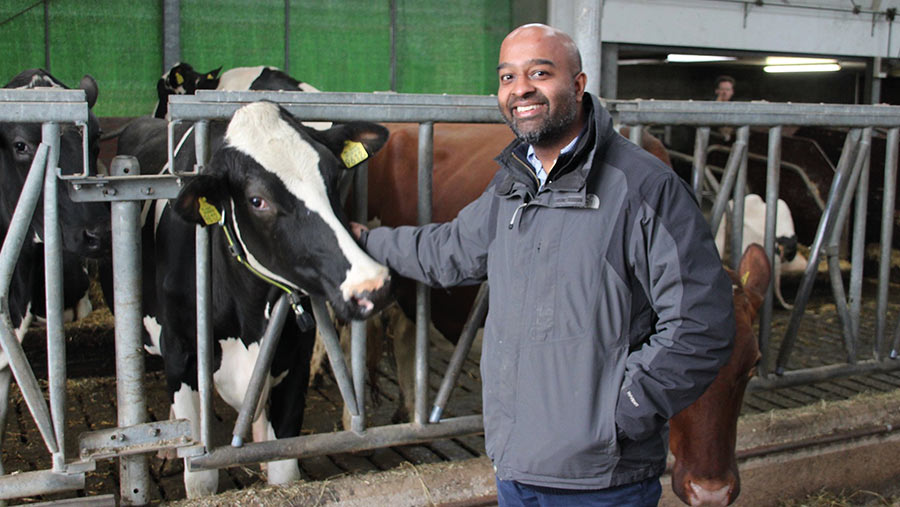How leadership training can help secure the future of farming
 © Wayne Hutchinson
© Wayne Hutchinson Some of the biggest organisations in farming have come together to raise awareness of leadership training across the industry.
Now in its second year, the #AgriLeadershipWeek social media campaign will run between 16-20 May, with the groups eager to improve attitudes towards leadership within the industry.
See also: Learn more about the ongoing transition of agriculture
They believe such training is undervalued in agriculture and horticulture, with more emphasis given to technical knowledge, and a perception that training is too expensive and time-consuming, and delivers a low return on investment.
But analysis of two AHDB leadership training programmes found it could be a sound investment, with attendees estimated to have achieved a return of £13 in business gains for every £1 spent.
With industry data suggesting less than 35% of UK farmers have any formal management training, more is needed, say the groups involved in #AgriLeadershipWeek.
The campaign is targeting both current and aspiring leaders in farming.
Throughout the week, each organisation will share on social media the success stories of farmers and people working in the industry who have flourished thanks to management courses, and show ways to get involved.
Up to £2,000 for ‘snapshot study’
To mark the start of #AgriLeadershipWeek, The Farmers Club Charitable Trust (TFCCT) is offering £40,000 of research funding to explore the future prospects for farming.
People working in agriculture or allied industries can apply for between £1,000-2,000 to complete a “snapshot study” based on a specific theme.
The themes are:
- Bringing technology to the industry
- Farming practices of the future
- Feeding the world (increasing production and reducing waste)
- Educating future farmers, growers and consumers
- Self-sufficiency in food production from UK agriculture.
The application window is open from 16-27 May. Applicants are required to submit a one-minute video explaining what they intend to study and why. If successful, the funds must be used to study the subject and present a three-minute video to explain the main findings.
For full details on how to apply, visit The Farmers Club Charitable Trust website.
TFCCT ambassador Lisa Turner said: “This is a really exciting initiative to be added to #AgriLeadershipWeek.
Celebrating our 40th year in this way highlights the importance of the trust’s commitment to support training and education within the industry.”
Responsibility
Izak van Heerden, AHDB senior knowledge exchange manager, says everyone can be a leader, and the farming industry needs people to take up the responsibility now.
“Farming is going through a period of unprecedented change, and it will be good leadership that will steer the industry through to the future,” he says.
“Fortunately, you don’t need a fancy title or office to be a leader. We can all be leaders in our businesses and roles. All it takes is the right mindset and some practice.”
Lincolnshire farmer Meryl Ward, who is a trustee of The Farmers Club Charitable Trust, agrees there are opportunities for leadership development at every level, which can change an individual’s career, life and business in many positive ways
“Strong leadership is needed to drive change in small and large businesses on farm and through the supply chain, and everyone can play a part,” she says.
“We hope to break down some of the barriers to accessing these opportunities, and to encourage everyone to progress their own leadership journey.”
Make a pledge
NFU president Minette Batters has thrown her support behind the campaign. “It is all about raising awareness of what leadership means to you, your business and your employees,” she says.
“This year we are asking everybody to commit to a pledge about what you are going to do to raise your level of leadership – whether that be listening to a podcast, reading a book, or going on a course.
“Please put it on social media as to what you are doing and let’s raise the profile of leadership and the importance of skills going forward.”

Case study: Finding the key to successful leadership
Farm vet Navaratnam Partheeban says he benefited greatly from taking part in the Oxford Farming Conference’s (OFC) Emerging Leaders programme.
“One thing that was really brilliant was learning what a leader should be,” he says. “I had this assumption it is somebody with a strong opinion, strong-minded and very forceful.”
But Mr Partheeban realised a good leader shows understanding and is able to adjust their approach based on the different people they are managing.

Navaratnam Partheeban © Navaratnam Partheeban
“When you are trying to lead many, many different types of people, you can’t be one type of leader that appeals to everybody,” he says.
Since taking part in the programme in 2020, Mr Partheeban has been awarded a Nuffield farming scholarship to examine diversity and inclusion in agriculture, and this year joined the OFC board of directors.
The vet says leadership is not learned instantly and is something people grow into.
“Take the time to talk to others, spend time with people, learn other things and gain confidence in yourself, in your own abilities.”
#AgriLeadershipWeek partners
The Farmers Club Charitable Trust, the Institute of Agricultural Management, AHDB, Nuffield Farming Scholarships, The Worshipful Company of Farmers, Council for the Awards of the Royal Agricultural Societies, Management Development Services, NFU, the Institute for Agriculture and Horticulture, Agricultural Universities Council UK, Oxford Farming Conference Inspire Programme.
